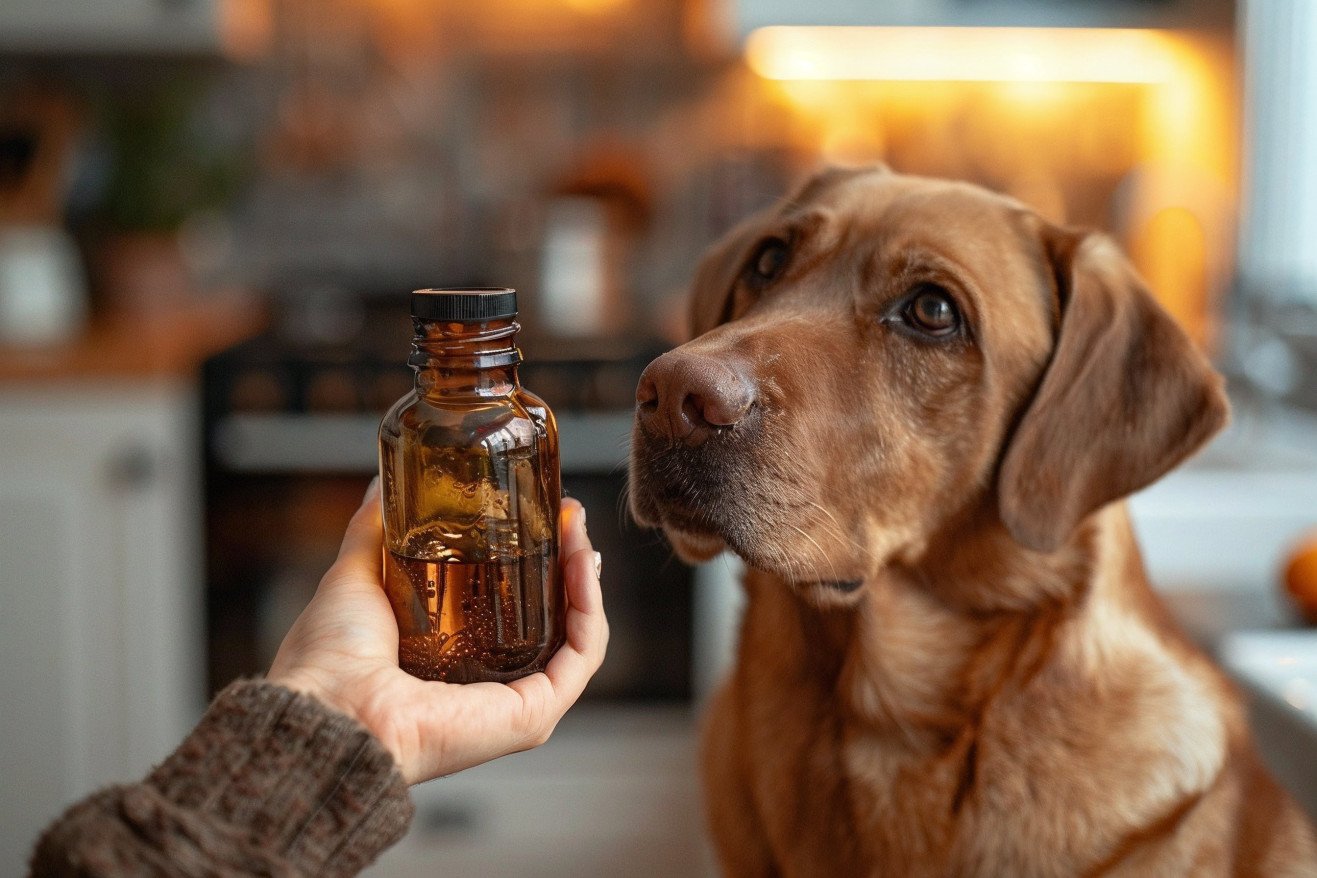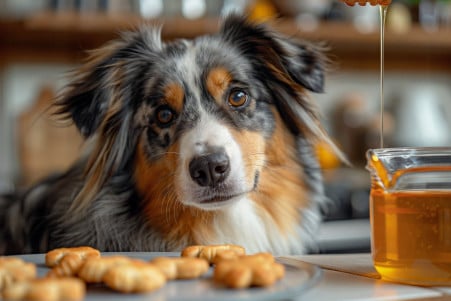Can Dogs Eat Vanilla? Exploring the Risks and Benefits
24 April 2024 • Updated 22 April 2024

If you love vanilla-flavored foods and drinks, you may have asked yourself whether you can give your dog a taste of your favorite treat. While vanilla is not toxic to dogs, it can be given to them in small amounts. However, many products that contain vanilla also contain other ingredients, such as sugar, fat, and chocolate, that can be harmful to dogs. As a result, it's best to give your dog a small amount of plain vanilla extract as an occasional treat.
Even though vanilla is safe for dogs, it's still a good idea to know the risks and benefits of letting your dog enjoy this popular flavor. This article will take a closer look at the research on dogs and vanilla, including the nutritional value of vanilla, how much vanilla dogs can have, and other treats that are safe for dogs and that they may enjoy. By reviewing the research of veterinarians and animal nutritionists, you'll be able to better understand how to safely give your dog vanilla and whether it's a good idea to do so.
Can dogs eat vanilla?
Vanilla Extract: A Danger for Dogs
Vanilla extract is a common flavoring in many baked goods and desserts that people enjoy. However, vanilla extract is dangerous for dogs because it contains a high level of alcohol. According to The Spruce Pets, vanilla extract and flavoring are toxic to dogs, and even a small amount of the liquid in the bottle can be a major health concern, especially for smaller dogs.
Even a small amount of vanilla extract can cause serious and potentially fatal side effects in dogs. DogTime explains that consuming vanilla extract can lead to alcohol toxicity, which can cause symptoms like vomiting, diarrhea, disorientation, seizures, and even death in the most severe cases.
If your dog consumes vanilla extract, it's important to act fast. Get rid of any remaining extract and call your vet right away for advice. Make sure you can tell them how much vanilla extract your dog ingested and when they ingested it, as this will help them figure out the best way to help your pet.
To be safe, it's best not to give dogs vanilla extract or any products that contain it. While alcohol-free vanilla extracts may be less risky, The Dog Bakery still suggests using them in moderation because they can still be dangerous to your dog's health. The best way to ensure your dog's safety is to avoid vanilla extract altogether.
Vanilla Pods and Paste: Safer in Small Doses
Vanilla pods and vanilla bean paste are safe for dogs in small amounts, says Hepper. These types of vanilla are more concentrated than vanilla extract, but they don't contain alcohol, so they're less toxic. However, It's About Dog points out that vanilla pods and paste don't offer much in the way of nutritional benefits for dogs.
That said, it's still important to make sure that dogs don't get too much vanilla pod or paste. According to The German Shepherds Forum, this can still lead to digestive problems and weight gain. As with any new food, make sure to introduce vanilla pods or paste into a dog's diet in moderation.
While vanilla pods and paste are generally safer than vanilla extract, it's still important to be careful when giving them to dogs. If you want to be sure that you're using these types of vanilla safely, talk to your vet to get personalized advice on how to incorporate them into your dog's diet in a way that won't cause any issues.
Vanilla-Flavored Dairy Products: Use Caution
While dogs can eat plain, non-fat yogurt in moderation, as it is a good source of protein and calcium, Purina points out that vanilla-flavored yogurts often have added sugars that can be bad for dogs. Meanwhile, BeChewy says to avoid yogurt with any artificial sweeteners, with xylitol being particularly dangerous to dogs.
Vanilla pudding is OK in small amounts but, as Dogster explains, it is high in sugar and fat, which can lead to obesity and diabetes. Dairy products like yogurt and pudding can also cause digestive issues, especially in dogs that are lactose intolerant.
To play it safe, it’s probably best to avoid giving your dog vanilla-flavored dairy products and instead give them treats that are better for them and don’t have any potentially dangerous ingredients.
Vanilla Ice Cream: Not Recommended
Vanilla ice cream is not recommended for dogs, even in small amounts. As noted by The Dog People by Rover.com, ice cream is high in sugar and many dogs are lactose intolerant, which can cause digestive problems. The American Kennel Club points out that dogs who are lactose intolerant should never be given ice cream because it can cause them extreme discomfort.
For dogs that can handle dairy, It's About Dog explains that vanilla ice cream is okay in moderation, but the high sugar content means it should be given sparingly. The good news is that there are plenty of dog-friendly ice cream options on the market that are free of harmful ingredients like xylitol.
Vanilla Essential Oil: Safe Practices for Use Around Dogs
The safety of using vanilla essential oil around dogs is not cut and dry and depends on a number of factors. According to Rocky Mountain Oils, the way the oil is used is important, and while diffusing is generally safe when done in moderation, direct inhalation and topical use are less safe.
It's also important to make sure that you're using a high-quality, pure vanilla essential oil and that you're diluting it with a carrier oil when using it topically, according to Weeding and Reaping. In addition, dogs should never ingest vanilla essential oil, as it can be toxic, according to Edens Garden.
If in doubt, it's probably best to avoid using vanilla essential oil around dogs or to ask a vet for advice, as the Rocky Mountain Oils article notes. It's important to take care when using essential oils around dogs.
Vanilla-Flavored People Foods: Use in Moderation
Vanilla is safe for dogs to eat in small amounts in certain vanilla-flavored people foods, including baked goods made with vanilla extract, vanilla bean ice cream, vanilla cake, and vanilla yogurt. According to The Dog Bakery, these types of vanilla are safe for dogs to eat as long as they are consumed in moderation. However, dogs should not eat artificial vanilla, real vanilla extract, or vanilla beans because they can be harmful due to their alcohol content.
In addition, dog owners should be careful about giving dogs vanilla wafers and ice cream because, as The Dog Bakery points out, they can be high in sugar and fat, which can be bad for dogs. As with other people foods that contain vanilla, it's important to use these products in moderation because, according to Spoiled Hounds, eating too much can cause digestive upset, weight gain, and other health issues.
In general, it's safer to give dogs homemade treats or dog treats that contain dog-safe vanilla instead of sharing vanilla-flavored people foods. This will help make sure that your dog can safely enjoy the taste of vanilla while supporting their health.
Conclusion: Using Vanilla Safely With Your Dog
While vanilla is generally safe for dogs in moderation, many vanilla-flavored products contain unhealthy ingredients like sugar, fat, and alcohol. It's best to avoid giving dogs vanilla extract, artificial vanilla, or baked goods that contain vanilla due to the high levels of alcohol or sugar they contain.
Dogs can have plain vanilla bean paste or small amounts of cooked vanilla as an occasional treat, but there are better options available. As with any new food, it's important to introduce it to a dog's diet gradually and monitor them for any negative reactions. A veterinarian can offer personalized advice on how to safely give a dog vanilla.


